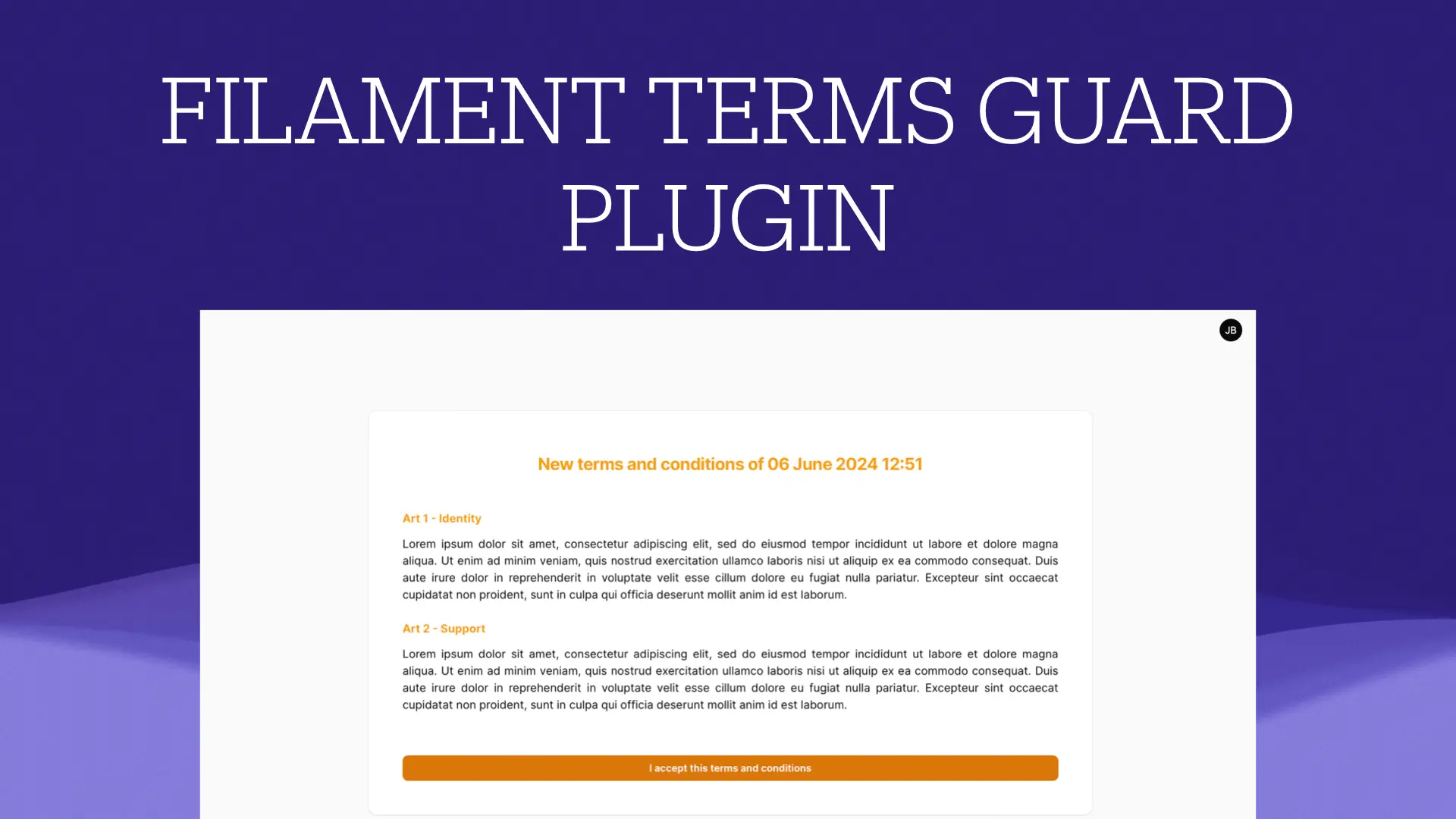- About
- Services
- Experiences
- Blog
- Portfolio
- Contact
Filament Renew Password Plugin
Get PluginContents
Introduction



The Filament Renew Password Plugin enhances Filament by prompting users to renew their passwords based on specified criteria.
Two default renewal processes are implemented:
- Recurring Renewal
- Force Renewal
You are free to add your own renewal criteria.

Installation
- Install the package using the composer command:
✅ Filament v4 and v5 compatibility are available in version 3.x of this plugin.
composer require yebor974/filament-renew-password✅ If you are using Filament v3, please install version 2.x:
composer require yebor974/filament-renew-password:^2.0
- Publish and run the migration, which adds new columns
last_renew_password_atandforce_renew_passwordto the users table.
php artisan vendor:publish --tag="filament-renew-password-migrations"
php artisan migrate
Alternatively, if you don't want to publish the migrations or already have columns in your database for such case, you can skip this step and customize the column name by using any of the configuration methods described in the Configuration section below.
- Optionally, you can publish translations files with:
php artisan vendor:publish --tag="filament-renew-password-translations"
- Register the plugin in your panel provider:
use Yebor974\Filament\RenewPassword\RenewPasswordPlugin;
public function panel(Panel $panel): Panel
{
return $panel
->plugin(new RenewPasswordPlugin());
}
Configuration
Filament Renew Password Plugin is designed to work out of the box with minimal configuration. However, you can customize the plugin by publishing the configuration file, changing the environment variables or using the plugin object to override the default settings.
Renewal Processes
Two configurations are available and can be used simultaneously.
- Recurring renew process
By default, recurring renewal process is disabled.
To activate recurring renewal process, you have to call passwordExpiresIn and define the number of days of recurring:
RenewPasswordPlugin::make()
->passwordExpiresIn(days: 30)
This activation automatically manages a last renewal timestamp column named last_renew_password_at. You can customize it with the timestampColumn function:
RenewPasswordPlugin::make()
->passwordExpiresIn(days: 30)
->timestampColumn('your_custom_timestamp_column')
- Force renew process
The force renewal process can be useful for example when an administrator creates a user. You can send a temporary password to the new user and force them to renew their password at the first login.
By default, force renewal process is disabled.
To activate it, you have to call forceRenewPassword function:
RenewPasswordPlugin::make()
->forceRenewPassword()
This activation automatically manages a force renew boolean column named force_renew_password. If you want to customize it, you can define with second param:
RenewPasswordPlugin::make()
->forceRenewPassword(forceRenewColumn: 'your_custom_boolean_force_column')
If you dont want the recurring renewal process but only want the force renewal process with also timestamp column you can add it with:
RenewPasswordPlugin::make()
->forceRenewPassword()
->timestampColumn('your_custom_timestamp_column')
- You can of course use both process with this configuration:
RenewPasswordPlugin::make()
->passwordExpiresIn(days: 30)
->forceRenewPassword()
And with columns customization:
RenewPasswordPlugin::make()
->passwordExpiresIn(days: 30)
->forceRenewPassword(forceRenewColumn: 'your_custom_boolean_force_column')
->timestampColumn('your_custom_timestamp_column')
Custom Renew Page
By default, RenewPassword simple page is used to ask user to renew it. You can custom it with:
RenewPasswordPlugin::make()
->renewPage(CustomRenewPassword::class)
Usage
Implement the RenewPasswordContract on your Authentication Model (User) and define the criteria for prompting password renewal in the needRenewPassword function.
- Default Trait
You can use the RenewPassword trait on your Authentication Model (User).
class User extends Authenticatable implements RenewPasswordContract
{
use RenewPassword;
}
This trait manages recurring renew if activated and/or force renew if activated:
public function needRenewPassword(): bool
{
$plugin = RenewPasswordPlugin::get();
return
(
!is_null($plugin->getPasswordExpiresIn())
&& Carbon::parse($this->{$plugin->getTimestampColumn()})->addDays($plugin->getPasswordExpiresIn()) < now()
) || (
$plugin->getForceRenewPassword()
&& $this->{$plugin->getForceRenewColumn()}
);
}
- Custom criteria
You can make your own criteria by implement needRenewPassword function on your Authentication Model (User).
In this case, you will certainly need to customize the RenewPassword simple page described above.
Migrate from V1 to V2
The V2 no longer automatically enables the password renewal process. You must define the processes to use according to the documentation above. Additionally, there are no longer any associated configuration files or .env variables.
To migrate to V2 and enable the recurring renewal process, you need to call the passwordExpiresIn function during your plugin initialization with the renewal period in days:
RenewPasswordPlugin::make()
->passwordExpiresIn(days: 30)
If you want to add the force renew process, you need to add the force boolean column to your authentication model (User) and declare it as shown in the Configuration section above.
$table->boolean('force_renew_password')->default(false);
associated posts
Other plugins
To contact me
If you have an idea to bring to life, a problem to solve, or a significant technical challenge to tackle, don't waste any more time. Contact me now and let me help you turn your ambitions into reality. My expertise is at your disposal to successfully materialize your projects.
My mail
Geographic location
Paris & Reunion Island (France - UTC+4)




